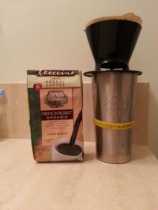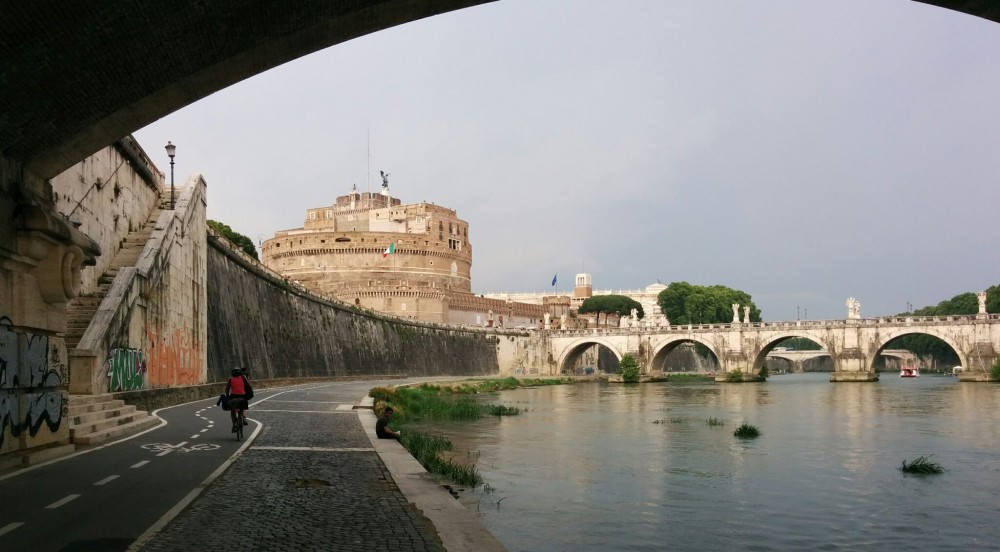Trip update: I am in Pinecrest, Florida, a village south of Coral Gables. My host is also a freelance translator, so her family and I have had plenty of time to work in our respective spaces around the house.

A bicycle kit may get stares in fine restaurants, but it still gets service. Seasons 52 in Coral Gables.
On Saturday, I had dinner with Stefano, another colleague, and his wife Lucia, at Seasons 52 on the Miracle Mile. He has been freelancing on the road for more than 20 years, because his principal activity is missionary work – for which he is not paid. His translation work is their family income. Even without a bicycle, he has certainly proven that he can make a living while travelling to churches and missions all over the world, with and without his family.
Tuesday, another translation job came in, which kept me off my bicycle for two days. As I worked indoors, heavy rain beat on the roof. While I was working, ATIF, the local association of language mediators, invited me to present an all-day workshop at Florida International University, so I will be staying in the Miami area for an extra week. Considering the weather that awaits me up north, I cannot complain!
It is time to take stock of this idea. After four months on the road, how do I feel about it?
In no particular order, here are some things I like and don’t like about living on my bicycle:
- Mail. PRO: thanks to Daniel and Tracy, this has gone smoothly. I don’t get that much real mail, and I appreciate having it screened for junk first. Even using mail-order has been smooth, whether I have the shopping sent to the next mail drop or have Daniel slap a new label on it when it arrives at the house in Charlottesville. CON: I lose some flexibility not being able to simply order something online. All my shopping has to be filtered through the schedule of mail drops, which often means that I can’t risk ordering something to be sent to me on the road. That means a second label (doubling the shipping) for Daniel to forward it to me after it arrives in Charlottesville. I also don’t like imposing on him for this kind of support.
- Maintenance and repairs.
PRO: I have been able to find bike shops and helpful wrenches (bike mechanics) whenever I needed them. The tools I carry seem to be just right. I have used most of them, so I am not carrying dead weight. The preventive maintenance schedule (PMS) works: changing cables before they break, ordering new tires before they blow out, cleaning the chain regularly, and changing parts that show wear during the PMS events. I have also been happy that the bicycle has handled the weight, the distance and the road conditions as well as it has. CON: flat tires are frustrating any time, but the number of flats in Florida has been downright disheartening. It has caused me to carry extra weight (two spare inner tubes instead of one), and detour to bike shops to replenish the stock. It also affected my riding, as I took longer, busy roads to avoid otherwise beautiful, smooth bike paths in the Tampa area for fear of carpet tacks.
- Laundry. PRO: living in spandex means that I only have a small load of cold-water wash every three or four days. At USD 6.00 (max) for both washer and dryer, that is affordable. I carry detergent in my toilet kit for washing in the hotel sink if there are no laundry facilities. I also have a compact camping clothesline and clothespins for hanging my sink-wash in the shower or elsewhere.
CON: not every place has laundry facilities. The sink washing has not proved very convenient, because in winter, my clothes don’t dry overnight as I expected. They might dry in warm weather or outdoors. It gets boring wearing the same jerseys every week, but I made myself leave half of them behind.
- General health. PRO: No doubt about it – exercise boosts the immune system. I have never been guilty of overtraining, and I have managed to get plenty of rest, especially after a difficult day (e.g., the cold rain in Flatonia, Texas, and the headwinds in Land o Lakes, Florida). This life style is a healthy one, leaving me free to sleep in if I work late in a hotel room, and change my schedule as needed. LabCorp has blood collection centers almost everywhere. Getting my blood drawn for the oncology prescription has been easy, and the HealthVault app gives me access to the results without a fax machine. CON: Although I have written about being ready to get sick, and I have stayed healthy so far, it is a drag to catch myself worrying about it, especially when riding far from civilization. Scales are rare, even in hotel fitness rooms, so I cannot monitor my weight as often as I would like. I also miss the other body parameters that my scale at home reads (%fat, %water, BMI, etc).
- Diet. PRO: It takes attention, but I think that I have managed to keep my diet balanced, even with the eating out that being on the road entails.

The indestructible Starbucks tumbler rides in a bottle bracket of my bicycle. It also holds the rig for the morning brew.
On average, about one third of my calories each have been coming from protein, carbohydrates and fats, which was what I hoped. I rarely eat more than two meals per day now. Instead, I have a late breakfast and an early supper, eating protein-rich snacks and tree nuts in between. My average caloric intake is 1700 calories/day, but I eat about 2000 calories on days riding between cities. That seems to keep my weight fairly stable, about 2 kg above my ideal riding weight. CON: it would be nice to lose those last 2 kg, but I can’t monitor my weight on the road consistently. I also cannot maintain a gluten-free diet on the road. If I were celiac, I would be in trouble, or not enjoying the trip as much. It is inconvenient to carry the meat snacks, nuts, and whey protein powder that I need to keep a healthy protein balance in my diet. Natural food stores seem to be rare outside large metro areas, so I have to plan not to run out of things, or order them by mail. The Teeccino® herbal coffee blend that I drink is expensive and often hard to find. It has taken me a long time to figure out how to enjoy it without carrying too much stuff to brew it.
- Exercise. PRO: Riding a bicycle everywhere means that I don’t have to worry about my cardiovascular fitness. I have only been in one place where there was not enough floor space for me to do my morning routine (about 24 minutes of stretches, yoga, and calisthenics). The routine targets my core and my upper body, compensates my bicycling (legs), and continues the rehabilitation of my right shoulder. CON: I hate exercise (the bicycle is transportation for me, not “exercise”). But the morning routine is something that I cannot skip at my age. (Yes, I’m whining: I would have this CON even back in Charlottesville!) Seriously, though, the routine includes 2-kg and 4-kg weights, but I have not found weights very often. I have to make up different exercises for the muscles worked by the weights. When I am stopped for a while (Pensacola, Gainesville, Tampa, Miami), I have to be careful not to eat too much, and to deliberately ride out to work “on the road” in the local area.
Next week, I will share the emotional side of living like this: things like loneliness, impatience, serenity, church life, hospitality, leisure activities and the stress of sharing the road with motorists, truckers, teenagers, rednecks, geezers, and even other bicyclists.
Smooth roads & tailwinds,
Jonathan.


